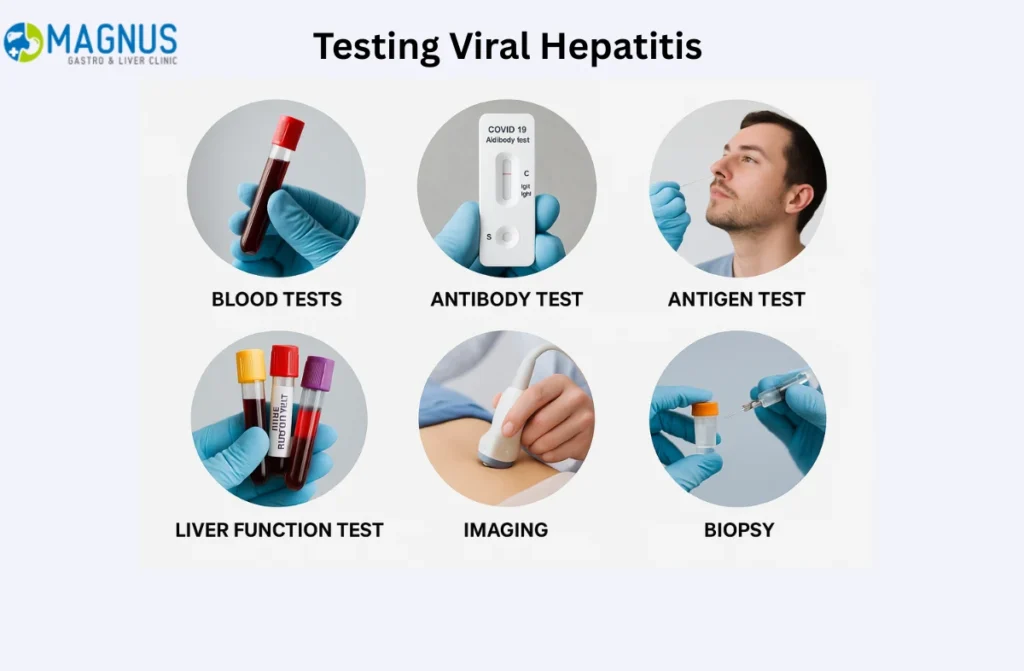Testing for viral hepatitis is a crucial step in identifying and managing hepatitis infections. It helps to determine the presence of the virus in the body and guide appropriate treatment plans. Early diagnosis through a viral hepatitis screening test can prevent serious complications like liver damage or cirrhosis. In this blog, we’ll discuss the importance of testing for viral hepatitis, the types of tests available, and who should get tested. Understanding hepatitis testing can help Foods for Liver Health make informed decisions about your health and get the necessary care.
What is Viral Hepatitis?
- Viral Hepatitis Definition: Hepatitis is an inflammation of the liver caused by viral infections.
- Types of Hepatitis Viruses: Hepatitis A, B, C, D, and E.
- Transmission: Hepatitis viruses spread through contaminated food, water, blood, and sexual contact.
- Symptoms: Fatigue, nausea, abdominal pain, and jaundice (yellowing of the skin).
- Chronic Hepatitis: Long-term infections that can lead to liver failure or liver cancer.
Testing for viral hepatitis helps identify the type of virus affecting the liver and decide the best treatment.
Types of Hepatitis
- Hepatitis A: Spread through contaminated food or water.
- Hepatitis B: Spread through blood or bodily fluids.
- Hepatitis C: Primarily spread through blood-to-blood contact.
- Hepatitis D: Can only occur in people infected with hepatitis B.
- Hepatitis E: Transmitted via contaminated water, especially in developing countries.
A chronic hepatitis b antibodies test is essential for diagnosing which type of virus is present and guiding treatment options.

The Role of Hepatitis Tests
- Diagnosing Hepatitis: Hepatitis tests help identify the virus causing liver inflammation.
- Monitoring Disease Progression: Regular tests check if the virus is progressing and affecting liver function.
- Guiding Treatment Decisions: Test results help doctors decide on antiviral treatments or liver transplant options.
Testing for viral hepatitis is essential for understanding the health of your liver and creating a personalized care plan.
Who Should Get Tested?
- High-Risk Groups: People who inject drugs, healthcare workers, and those with a history of blood transfusions.
- Chronic Conditions: People with existing liver disease should get tested regularly.
- Travelers: Individuals traveling to areas with high rates of hepatitis.
- Unprotected Sex: Those with multiple sexual partners or unprotected sex.
Testing for viral hepatitis can detect the virus early, especially in high-risk individuals.
Getting Test Results
- Turnaround Time: Results typically take a few days, depending on the test.
- Positive Results: A positive result means the virus is present and may require treatment.
- Negative Results: Indicates no current infection, but may not rule out past exposure.
- Follow-up: If the test is positive, additional tests may be needed to determine the type of hepatitis.
Understanding the results of testing for viral hepatitis is key to making informed health decisions.
Types of Hepatitis Tests
- Blood Tests: Most common for detecting hepatitis viruses in the body.
- Liver Function Tests (LFT): Measure liver damage caused by hepatitis.
- Antibody Tests: Detect antibodies that show past or current infection.
- PCR Tests: Measure the amount of virus present in the blood.
A viral hepatitis screening test helps identify the specific virus and the level of infection.
Getting Tested for Hepatitis
- Visiting a Doctor: A doctor will recommend the necessary hepatitis test based on symptoms or risk factors.
- Testing Centers: Many clinics and hospitals offer testing for viral hepatitis.
- Cost of Testing: Hepatitis testing is generally affordable, though prices may vary by location.
- Confidentiality: Hepatitis tests are confidential, ensuring privacy for individuals.
Testing for viral hepatitis is simple and accessible, and many people can get tested at their local clinic.
Why Is Hepatitis Testing Important?
- Early Detection: Helps catch hepatitis before it causes serious liver damage.
- Prevention: Allows for treatment and lifestyle changes to reduce the risk of liver failure.
- Protecting Others: Prevents the spread of hepatitis to others, especially in the case of viral hepatitis B and C.
A diagnostic test for viral hepatitis can significantly impact your long-term health and prevent the spread of the virus.
How Is the Hepatitis Test Performed in Chennai?
- Local Clinics and Hospitals: Many healthcare facilities in Chennai offer hepatitis testing.
- Blood Draw: Most hepatitis tests involve a simple blood draw to check for viral infections.
- Affordable Testing: Hepatitis tests are generally affordable in Chennai and available in most clinics.
- Quick Results: Results from testing for viral hepatitis typically return within a few days.
Testing for viral hepatitis is easily accessible in Chennai, with a range of healthcare facilities providing quick and affordable services.
Conclusion
Testing for viral hepatitis is crucial for early detection and management of the disease. Regular screening through a viral hepatitis screening test can help prevent severe liver complications and allow for timely treatment. If you think you’re at risk, it’s important to seek testing and get the necessary care. The chronic hepatitis b antibodies is simple, affordable, and available in most healthcare facilities, including those in Chennai. Don’t wait to get tested early action can save your liver and your life.
Read Also: Best Gastroenterologist in India




